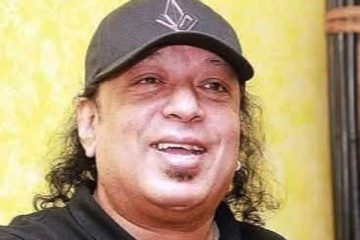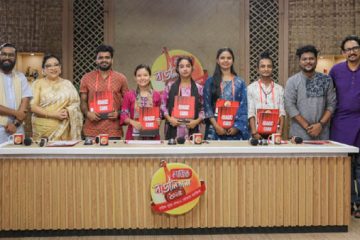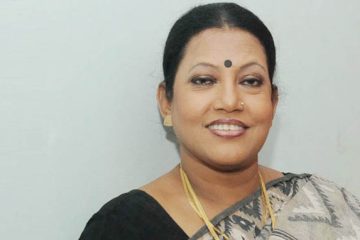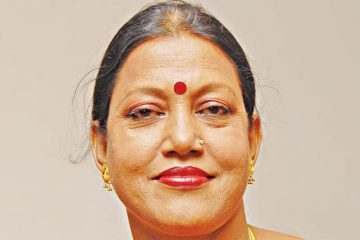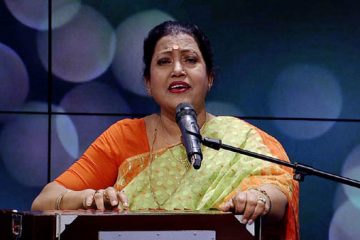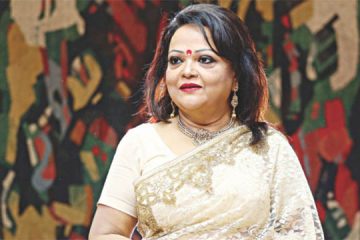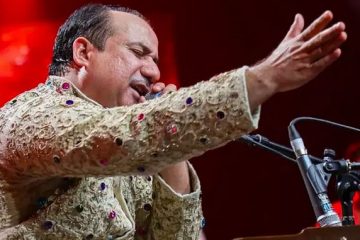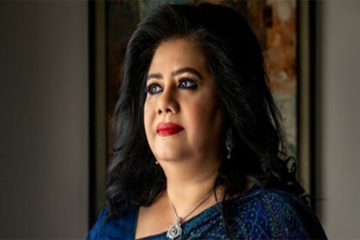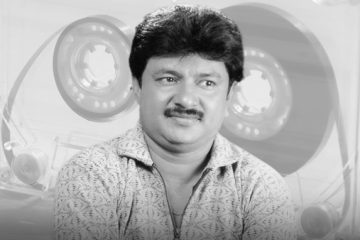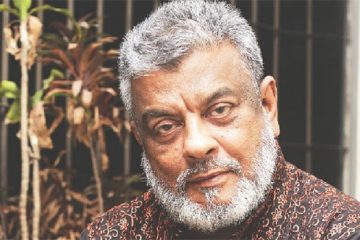In conversation with Mitali Mukherjee
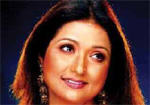 Tomar chandana more gechhey after performing this timeless song in a recent solo TV show, India-based Bangladeshi singer Mitali Mukherjee urged the audience to not let the character in the song die, which personified the singer herself, to the music lovers in Bangladesh. After rending another famous ghazal number Raahon pe nazar rakhna, which she usually performs with her husband, renowned ghazal singer Bhupinder Singh, Mitali urged the TV show audience to always keep the door open for her.
Tomar chandana more gechhey after performing this timeless song in a recent solo TV show, India-based Bangladeshi singer Mitali Mukherjee urged the audience to not let the character in the song die, which personified the singer herself, to the music lovers in Bangladesh. After rending another famous ghazal number Raahon pe nazar rakhna, which she usually performs with her husband, renowned ghazal singer Bhupinder Singh, Mitali urged the TV show audience to always keep the door open for her.
Though the Mumbai-based singer spends her time composing, recording and performing ghazals, geets and other genres of music together with her husband, in India, her soul is intimately attached to her roots and she always misses her old days – memories with her friends and family in Bangladesh, which is reflected in the melancholic melodies of her songs, which carry of nostalgia, which she frequently performs, especially while performing in Dhaka.
And how can music lovers in Bangladesh forget her, whose name still brings back memories of the years when melody and lyrics were the essence of adhunik songs (contemporary music) in early 1980s? The extremely talented singer presented some evergreen melodies such as Harano diner moto, Sukh pakhire, Ei duniya ekhonto aar sei duniya nai and many more.
Many new generation readers don’t even know that in her very early age, Mitali Mukherjee was a singer at the Swadhin Bangla Betar Kendra, the radio station that carried out a propaganda war on behalf of the freedom fighters during the war of independence in 1971.
Born in a very vibrant cultural family in the early 1960s in Mymensingh, Mitali began her formal training in classical music at a very tender age under the guidance of Mithun Dey. Being a member of Mukul Fauz, Mitali for the first time appeared in a TV show at the age of six. In the programme she rendered the Nazrul song Ekadoshir chand rey oi, since both her father and guru always insisted on her to perform Nazrul songs, Mitali told New Age.
Subsequently, Mitali joined Swadhin Bangla Betar Kendra in 1971 where she rendered patriotic songs to encourage the freedom fighters. Mitali however won the hearts of thousands just after performing the song Sukh Pakhire in BTV in the late 1970s. In fact, she created hysteria in the music industry with her soothing voice and versatility in all genres of music. She won the National Award in 1981 for playback, Ei duniya ekhon to aar sei duniya nai in the movie Dui Poishar Alta. The song took the music industry by storm; misty-eyed listeners continue to hum it till this day.
‘I consider myself very fortunate, since, be it in India or Bangladesh, I got very good lyrics and music, which is very important to get exposure. Without good lyrics and tune, no singer can prove his or her talent. So I pay respect to those talented lyricists and composers who helped groom me as a singer,’ she said.
‘I still remember that moment when I had to bargain with talented composer-lyricist Alauddin Ali to record the timeless song Ei duniya ekhon to aar, which he wanted to record with talented singer Sabina Yasmin. I am indebted to composer Alauddin Ali, Sheikh Sadi Khan, lyricist Maniruzzaman and others,’ she added.
Mitali went to India with a scholarship from the Indian government and completed M. Phil from SNDT, College, Mumbai. Subsequently, she married singer, composer and ace guitarist Bhupinder Singh in 1983 and settled down in Mumbai. This union also saw the once very popular playback singer and guitarist Bhupinder Singh only to concentrate on ghazal. The sensational duo Mitali-Bhupindar became the darling of ghazal and geet lovers.
The duo also composes and records other genres of music in different languages, including Bangla. They have recently added a new repertoire to their resume, when, celebrating the 150th birth anniversary of Nobel laureate Rabindranath Tagore, the celebrated duo released an album on Tagore songs titled Shedin Dojoney.
‘Tagore songs apparently seem very easy to render but to me, it’s one of the most difficult,’ Mitali observed.
In response to a question whether the duo will perform together in Dhaka, Mitali said, ‘If we get any proposal we will definitely consider it.’
Mitali, however, wishes to do something more for Nazrul songs. ‘I’m still guided by my father’s affection for Nazrul songs. My husband and I released an album on Nazrul songs from Kolkata, which got popularity over there. In future I have plans to contribute more to Nazrul songs. But I don’t want to disclose those plans right now,’ she said.
Mitali is always amazed and encouraged by the affection and love that she receives from the people of Bangladesh and is willing to train singers, if she gets any such proposal.
Courtesy of New Age

